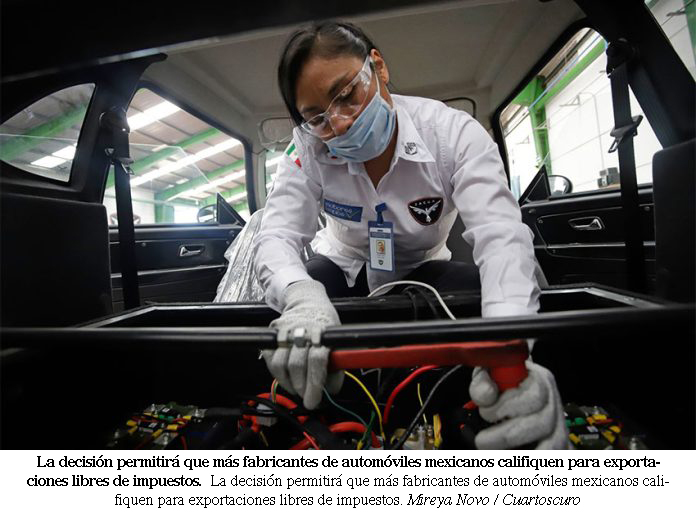by Mexico News Daily
A dispute panel has ruled in favor of Mexico and Canada in a disagreement with the United States over content rules for vehicles under the USMCA free trade pact.
Mexico and Canada filed a complaint against the U.S. over the interpretation of auto-sector content rules a year ago.
Under USMCA — the North American free trade agreement that superseded NAFTA in 2020 — 75percent of a vehicle’s parts must be made in the region in order for the vehicle to qualify for tariff-free status.
Mexico and Canada argued that if a “core part” of a vehicle, such as its engine or transmission, is made with 75percent regional content, the free trade agreement allows the figure to be rounded up to 100percent when calculating the overall requirement for regional content.
In contrast, the United States view was that “core part” content cannot be rounded up when calculating the regional content percentage of an entire vehicle.
Mexico and Canada warned that the U.S. interpretation could prevent Mexican and Canadian manufactures from qualifying for duty-free trade in North America.
The dispute panel sided with those two countries, saying in a ruling last Wednesday that the U.S. interpretation was “inconsistent” with the USMCA. In accordance with the trade pact, the United States must now reach agreement with Mexico and Canada on how the panel’s decision will be applied, or else face the possible imposition of retaliatory tariffs.
“We are reviewing the report and considering next steps,” said Adam Hodge, an official with the United States Trade Representative’s Office. He said that the U.S. would “engage Mexico and Canada on a possible resolution to the dispute.”
Hodge described the panel’s ruling as “disappointing” and asserted that it could result in “fewer American jobs.”
Tatiana Clouthier, a recently-departed federal economy minister, said that the decision was “excellent news” in a video posted to Twitter, while Canadian Trade Minister Mary Ng said in a statement that Canada “”is glad to see that the dispute settlement mechanisms in place are supporting our rights and obligations negotiated in USMCA.”
Mexico’s Economy Ministry said in a statement that, “in the coming days, Mexico will begin a process of dialogue and cooperation with its trading partners.”
Flavio Volpe, president of Canada’s Automotive Parts Manufacturers’ Association, said that the dispute panel decision is “good for Canada and Mexico.”
In a separate USMCA dispute, the United States and Canada last year challenged Mexico’s nationalistic energy policies, arguing that they are inconsistent with its trade agreement obligations. The three countries are attempting to resolve that dispute without the intervention of a dispute panel.
With reports from Reuters.
Strict anti-smoking law takes effect across Mexico
by MND Staff
A revised law that bans smoking in all public places and prohibits retailers from displaying cigarettes took effect on Sunday.
The General Law for Tobacco Control “amounts to one of the most stringent anti-smoking laws in the world,” according to a BBC report.
People are now explicitly banned from smoking in outdoor public places such as parks, town squares and beaches as well as offices, hotels, restaurants, schools, stadiums, shopping centers and entertainment arenas. Smoking is already banned in many of the aforesaid indoor spaces.
The anti-smoking law also prohibits all forms of advertising and promotion of cigarettes including sponsorship arrangements involving tobacco companies. Retailers such as the ubiquitous convenience store Oxxo are no longer permitted to stock tobacco products in open view of customers.
Health regulator Cofepris will be responsible for ensuring compliance with the law, which is expected to have an impact on demand for tobacco.
The federal Health Ministry anticipates that the new law will prevent 49,000 premature deaths and 292,000 cases of smoking-related illnesses over the next 10 years, the newspaper El Financiero reported.
The Pan American Health Organization (PAHO), an agency of the World Health Organization, noted in a statement last month that Mexico’s Senate unanimously approved an amendment to the General Law for Tobacco Control that established “100percent smoke-free environments and a total ban on the advertising, promotion, and sponsorship of tobacco products on December 14, 2021.”
“This amendment represents a historic step forward for Mexico in its anti-smoking policies and reaffirms its role as one of the leaders in the fight against tobacco in the world,” said Cristian Morales, PAHO representative in Mexico.
In contrast, “some smokers are dismayed at the draconian nature of the new law,” the BBC reported, noting that smoking outside private residences will be restricted in many cases.
It remains to be seen how strictly the anti-smoking law will be enforced in a country where approximately 16 million people — one in eight Mexicans — smoke.
According to the BBC, many Mexicans fear that corrupt police will use the law to collect bribes from people who are caught smoking in places where the habit is prohibited.
With reports from El Financiero and BBC.



